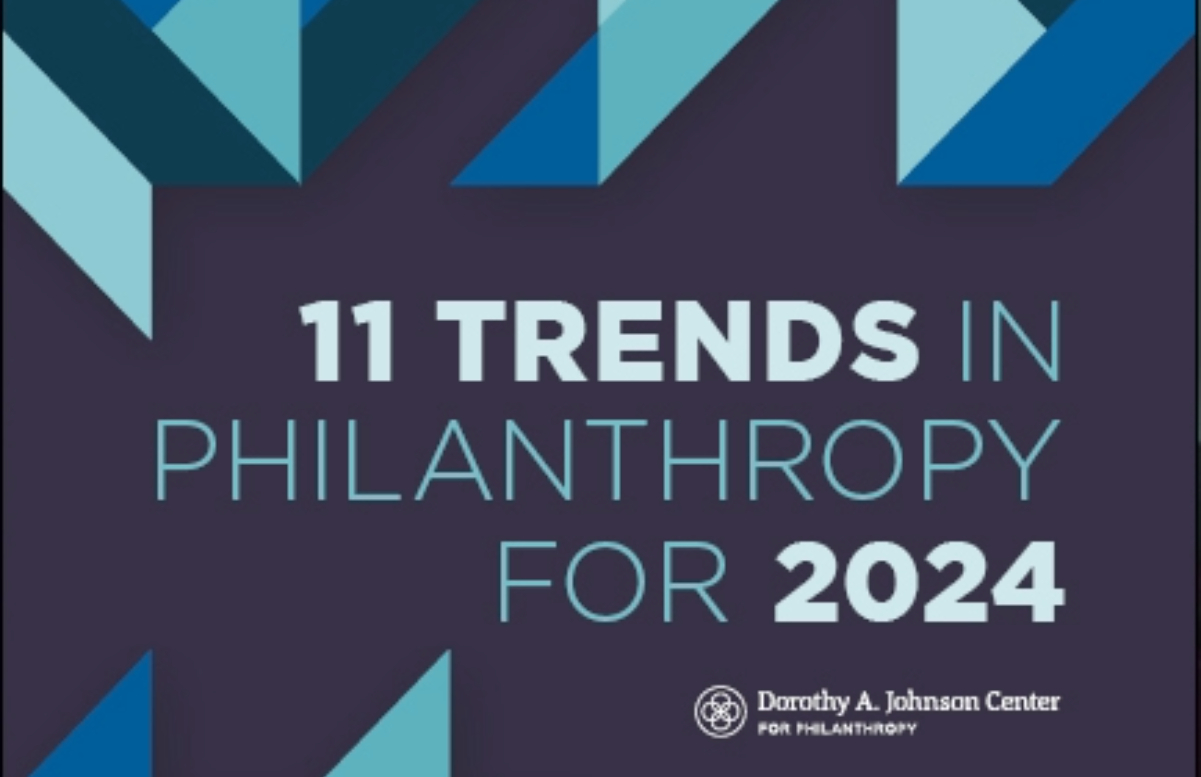A new publication offers 11 short essays about the changing nature of philanthropy and other nonprofit concerns. Essay topics range from demographics considerations (the role of Asian American and Pacific Islanders, Black women, Generation Z in nonprofit leadership and philanthropy) social concerns (measuring outcomes for incarcerated students, commenting on changing race and ethnicity standards) and functional matters (artificial intelligence, donor anonymity) among others.
The essays are presented as topics for consideration rather than neatly packaged solutions. “[R]eaders will find a set of questions rather than answers,” the report’s coordinators wrote in the introduction.
“Each trend poses a number of moral, economic, equity-related, tactical, and other questions that the sector will have to answer”, according to the authors of 11 Trends in Philanthropy for 2024, which was published by the Dorothy A. Johnson Center for Philanthropy, which is part of the Grand Rapids, Michigan-based Grand Valley State University. The authors of the individual essays were drawn from the Johnson Center’s staff.
Essay topics include:
* With Thousands of Incarcerated Students Enrolled in Higher Education, How do We Measure Success?: This essay offers guidelines for evaluating the 400+ Higher Education in Prison programs and their potential impact on recidivism.
* AAPI Communities are Leading an Upswell in Philanthropy: As the Asian American/Pacific Islander community grows, its economic, political, and philanthropic impact increases despite structural barriers.
* With Crisis Comes Change — Black Women and the Glass Cliff: Black women are often brought in as heads of failing nonprofits, thereby setting up members of this cohort to disproportionately be held accountable when the organizations fail.
* A Wake-Up Call for Investing in the South: Population booms in the American South, especially Texas and Florida, make it a newly viable region for funding solicitation as well as support of its tax-exempt institutions.
* Expected Changes to Federal Race and Ethnicity Standards Present Opportunities — and Caveats: The U.S. government’s increased focus on MENA (Middle Eastern and North African) individuals as distinct populations highlights their unique concerns.
* Affordable Housing is a National Crisis with a Distinct Local Impact: Local governments are better positioned to mitigate the causes of homelessness within their areas of governance.
* The Fiscal Sponsorship Model: A Growing Trend in the Nonprofit Sector: Fiscal sponsorships allow individuals and groups to engage in charitable activities affiliates in conjunction with 501(C)(3) organizations without the managerial headaches of establishing nonprofits themselves.
* The Artificial Intelligence Revolution Arrives in Philanthropy: Nonprofits are increasingly investing in artificial intelligence and are reaping rewards from doing so.
* Donor Anonymity Is Under the Microscope: During the past two years, more than 120 bills calling for greater funder disclosure have been proposed, despite the seeming settlement of the question when the Supreme Court decided Americans for Prosperity Foundation v. Bonta in 2021.
* Financial Stress and Philanthropic Influence: The Precarious Promise of Generation Z As individuals born between the mid-1990s and the early 2010s mature, nonprofits need to get a handle on how they experience personal finance issues and engage in philanthropy.
* Influencer Philanthropy Is On the Rise, but the Platform Matters: As influencers increasingly drive philanthropy the where — whether via a social media platform, through newly established influencer-focused organizations or individual outreach efforts — is becoming as important as the influencers themselves.
A full copy of the report is available here: https://johnsoncenter.org/blog/11-trends-in-philanthropy-for-2024/










